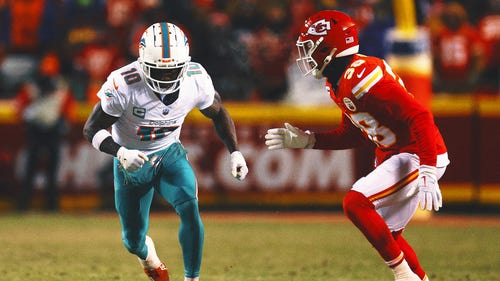
Steroids found in Garrett Reid's room
An investigation into the fatal heroin overdose of Garrett Reid, the oldest son of Philadelphia Eagles coach Andy Reid, revealed there were steroids in his room the day he died, a Pennsylvania prosecutor said Monday.
Northampton County District Attorney John Morganelli said that anabolic steroids were found in the room where Garrett Reid was staying when he overdosed on heroin Aug. 5 during Eagles training camp. Reid was helping the team's strength and conditioning coach at the time of his death.
Morganelli said there was no evidence that Reid was giving the steroids to any Eagles players. He said that investigators could not determine if the drugs were for Reid's own use or for distribution.
The prosecutor showed little appetite for a deeper probe, saying his investigation was focused on the circumstances surrounding Reid's death at age 29.
''The issue of steroids, it's an illegal substance in Pennsylvania law. It has probably more significance in the sports world. But since it did not appear to be related to his death, we're not pursuing that any further,'' Morganelli said.
Eagles Chairman Jeffrey Lurie called the news of the steroids disappointing, and noted that neither the organization nor the players were aware of or involved with anything related to the banned substances.
''It's clear the conduct in which he apparently engaged runs counter to the values and principles mandated for everyone associated with our organization. We have spoken with the league office and have pledged our full cooperation with their requests should there be any,'' Lurie said.
''While we remained saddened by the tragic end of a young man's life and know how hard this must be for the entire Reid family, we are extremely confident that Garrett's actions were unknown to those around him and did not involve our football team.''
Lehigh University police were called to Reid's dorm room at Lehigh University in Bethlehem around 7:20 a.m. on Aug. 5, arriving after Eagles team physician Dr. Omar Elkhamra had tried to revive him with a defibrillator.
Investigators searching his room found a used syringe and spoon, along with a gym bag filled with dozens of syringes and needles, many of them unopened, as well as 19 vials of an unknown liquid.
Testing revealed the vials contained four types of anabolic steroids, Morganelli said.
But he said he did not have any evidence that Reid was distributing steroids to players.
Asked how aggressively his office and Lehigh University's police department pursued the question, Morganelli said: ''Lots of interviews were conducted by the police. And I can't go into all of them, but all I can say is that we could not provide any evidence or substantiate that anybody in the Eagles organization was involved in this, or whether or not this was for his personal use. It was just undetermined.''
He acknowledged the quantity found could have been intended for distribution, ''but what I'm saying is I have no evidence of that, that there was any distribution by Mr. Reid, either here or anywhere else.''
The prosecutor said he had not been in touch either with the NFL or the Eagles organization.
In a statement, Andy Reid said he was ''confident that my son's decisions did not affect our football team in any way.''
''I cannot apologize enough for any adverse appearances that my son's actions may have for an organization and a community that has been nothing but supportive of our family,'' the Eagles coach said.
Northampton County Coroner Zachary Lysek said Monday that testing is under way to determine if Reid had steroids in his system at the time of his death.
It was Lysek who determined previously that Reid succumbed to an accidental overdose of heroin. After the coroner announced his findings in October, investigators focused on learning who had supplied him with the drug, combing through Reid's phone records to see who he was calling and texting before his death. But Morganelli said that probe ran into a dead end.
''It cannot be determined whether Mr. Reid obtained heroin here in the Lehigh Valley or brought it with him to training camp from elsewhere,'' Morganelli said, adding that Lehigh University police have closed the investigation.
Reid seemed to have rebounded from a long struggle with drug abuse.
He was sentenced to nearly two years in prison for a 2007 high-speed car crash that injured another driver. Police said Reid was high on heroin, and they found the drug and more than 200 pills in his car.
More recently, exercise and training had become his passion and he aspired to make it a career. At the time of his death, he had been helping strength and conditioning coach Barry Rubin. But an autopsy revealed his body showed signs of chronic drug use.
Reid's younger brother, Britt, has also struggled with drug use and was arrested on the same day as Garrett in 2007 after a road-rage incident. Police discovered weapons and drugs in Britt Reid's vehicle. He now works as a graduate assistant coach at Temple.















































































































































